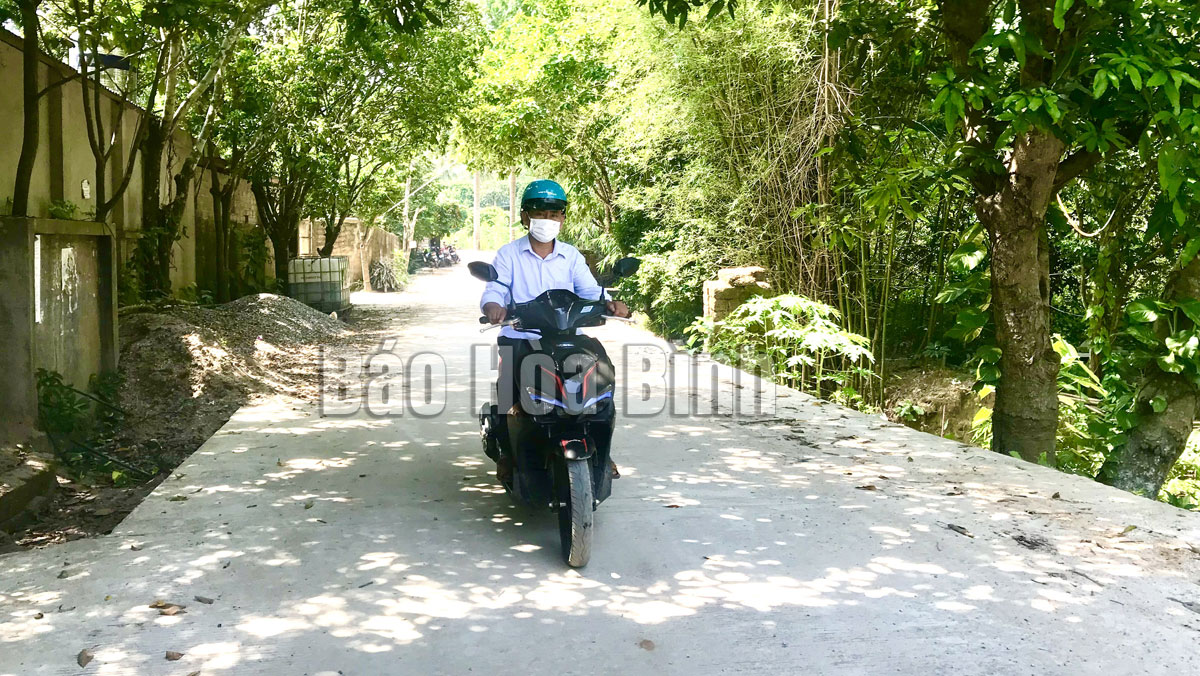
(HBO) - Heroic people and heroic land are what the village elders in Mong Hoa commune (Hoa Binh city) refer to when talking about the old victories in the two resistance wars against the French colonialists and the American imperialists. Since then, the land of Mong Hoa has put on a "new coat" of prosperity and happiness, and people's lives have been improved both materially and spiritually.
Infrastructure of Mong Hoa commune (Hoa Binh city)
is upgraded with all roads concretised, meeting the travel demand of the
residents.
Arriving at Mong Hoa today, we clearly recognise the change in its appearance
from the sprouting up of industrial parks and factories to spacious concrete
roads and big houses.
Mong Hoa commune has been merged from Mong Hoa (former) and Dan Hoa communes.
These are the two localities that have completed the new-style rural areas
building, so the new Mong Hoa commune now has many favourable conditions for
socio-economic development. In particular, industry-handicrafts and trade -
services fields are gradually becoming strengths of the locality.
Currently, the commune has 282 individual business households, most
concentrated in Bai Nai area.
The commune has an industrial cluster zone operating in the area with
investment from eight enterprises and 35 enterprises having gone into
production and business activities, creating jobs for over 1,400 employees.
Agricultural activities has also been prospered. Outstanding results have been
obtained in the first six months of this year. They include 83 hectares of
lemongrass and 120 hectares of vegetables and beans of all kinds, maintaining
and develop poultry herds of over 45,600 heads and over 1,600 heads of
livestock and over 1,800 pigs. In particular, there are about 45 beekeeping
households which collect thousands of liters of honey per year, worth nearly 1
billion VND (943,750 USD) a year.
Strolling on the concrete road from the gate of Du Phuong village to other
hamlets, it is easy for everyone to feel that people here have benefited from
practical values from the new-style rural building construction programme.
For example, all rural road are concretised. The commune has two
community houses and each village has one that people can gather for community
activities. All schools meet national standards and 100 percent of
households access to the electricity.
To achieve these results, the commune has mobilised resources up to nearly 93
billion VND, of which, local residents contributed nearly 21 billion VND,
accounting for 23 percent of the total economic . The average income per
capital in the commune has reached 50 million VND a year and the poverty rate
has decreased to 1.52 percent./.
More than just an information technology teacher, Bui Van Nien is an inspiring figure who has nurtured the scientific curiosity and creative spirit of students in Vietnam’s ethnic minority communities.
Da Bac is the most disadvantaged mountainous district in Hoa Binh province, with ethnic minorities accounting for about 90% of its population. Over the past years, the district has mobilised resources to implement ethnic policies to improve the quality of life of local people.
In recent years, Hoa Binh province has consistently prioritised the protection, care, and education of children, particularly those from ethnic minorities and disadvantaged backgrounds, by creating a safe, healthy, and nurturing environment for their all-round development.
The Steering Committee for Tobacco Harm Prevention and Control of Hoa Binh province, in coordination with the Tobacco Harm Prevention and Control Fund, held a ceremony on May 28 in response to the World No Tobacco Day (May 31) and the National No Tobacco Week (from May 25 to 31). The event was chaired by Nguyen Van Toan, Standing Vice Chairman of the provincial People’s Committee and head of the Steering Committee.
Since 2021, the Center for Industrial Promotion and Industrial Development Consulting (CIIDC) under the Department of Industry and Trade has been implementing a school lighting model as part of the plan for using energy efficiently and economically in Hoa Binh Province in the pẻiod of 2021 - 2025. This model not only aims to improve the learning conditions and enhance the education quality, but it also promotes the message of energy saving, energy security, environmental protection and contributes to the goals of socio-economic development.
In the 2024 - 2025 school year, the entire Hoa Binh provincial education sector includes 520 educational institutions and schools. Among them are 13 ethnic boarding schools with 153 classes and 4,487 students. Four of these schools have met national standards, reaching 30.7 percent.



